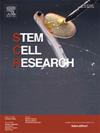Generation and characterization of human iPSC line SANi011-A from a patient with an inherited platelet disorder carrying the heterozygous FLI1 c.297del variant
IF 0.7
4区 医学
Q4 BIOTECHNOLOGY & APPLIED MICROBIOLOGY
引用次数: 0
Abstract
FLI1, a member of the ETS transcription factor family, is associated with Paris-Trousseau thrombocytopenia, and germline FLI1 mutations have been identified in patients with inherited platelet disorders. We generated the iPSC line SANI011-A from a patient carrying a de novo heterozygous nonsense mutation, FLI1 c.297del. Proerythroblasts derived from the patient’s peripheral blood were reprogrammed into iPSCs using the non-integrative Sendai virus (SeV) delivery method. The resulting iPSC line exhibited normal karyotype, expressed pluripotent markers, and demonstrated the capacity for trilineage differentiation. The iPSC line provides a valuable model for studying hematopoiesis, particularly megakaryopoiesis and FLI1-related platelet disorders.
携带杂合FLI1 c.297del变异的遗传性血小板疾病患者的人类iPSC细胞系SANi011-A的产生和特性
FLI1是ETS转录因子家族的一员,与Paris-Trousseau血小板减少症有关,在遗传性血小板疾病患者中发现了种系FLI1突变。我们从一名携带全新杂合无义突变FLI1 c.297del的患者身上产生了iPSC细胞系SANI011-A。采用非整合性仙台病毒(SeV)递送方法将患者外周血的原红细胞重编程为iPSCs。由此获得的iPSC系核型正常,表达多能性标记,具有三龄分化能力。iPSC系为研究造血,特别是巨核造血和fli1相关血小板疾病提供了一个有价值的模型。
本文章由计算机程序翻译,如有差异,请以英文原文为准。
求助全文
约1分钟内获得全文
求助全文
来源期刊

Stem cell research
生物-生物工程与应用微生物
CiteScore
2.20
自引率
8.30%
发文量
338
审稿时长
55 days
期刊介绍:
Stem Cell Research is dedicated to publishing high-quality manuscripts focusing on the biology and applications of stem cell research. Submissions to Stem Cell Research, may cover all aspects of stem cells, including embryonic stem cells, tissue-specific stem cells, cancer stem cells, developmental studies, stem cell genomes, and translational research. Stem Cell Research publishes 6 issues a year.
 求助内容:
求助内容: 应助结果提醒方式:
应助结果提醒方式:


